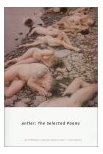|
Contents » Cover
» Feature |
||
|
Essays
Antler's is a one-man living manifesto. These honest, ribald, randy, luscious, lusty, sensual, generous, natural poems move with such ease that one feels Whitman's ghost clapping on the sidelines. It's a further sad commentary on culture in the United States that Antler, legendary and well loved as he is, must tend his poems door to door like Whitman. This selected poems must be celebrated, and well. I have admired Antler's work from afar for a long time and when I became poetry editor of Oyster Boy Review I was determined that his work would one day appear in OBR's pages (and they will soon). He must also be the most prolific (while retaining a high level of quality) male poet in America (only Lyn Lifshin, a woman, may outrank him there). The Beats live in his work too, but in a younger more innocent and less strangling way—easy, that's the word I like. As much as one thinks of Ginsberg (and his championing of Antler's work through the years), it's Snyder Antler seems most "like." He's tenderer, almost frail even when he's rebelling. He's a meditative poet of the woods and cosmos, and yet his enlightenment embraces the earth as freely as it embraces eternity. There are lots of good sex poems here. Like Whitman, Antler cannot, will not, separate sex from love. His love is all embracing and to make love is to be love. The poem "Ejaculation" begins "Every Universe is an ejaculation" and through trees, fruits, and corpses it moves until 39 lines later he proclaims "Show me anything that's not an ejaculation." Antler manages to make what might seem trite abstractions into actual realizations. His mind is Zen, his body is hot, and his words entwine. Antler loves to come and he loves for others to come too, but his poems are not just about sex—he is a biting social critic of American business as well as sexual hypocrisy. This has not made him a babe of the grant givers. Too much boysex, too many trees, and too much commentary on the life of the factory worker. In "Factory" the revelatory blends with the critical in surprising ways—we see Whitman's forthright and vernacular American worker weighted down by the power of the machine: "As multitudes worked on the machines / . . . / For me they waited, patiently, the machines / all the time in the world / . . . / Before I said I would rather be dead / than sweat at the work of zombies, / The machines waited." Antler speaks from experience and describes the deadening repetition of daily life at the Continental Can Company. "Factory" is a frightening true-life description of Blake's fiery furnaces. Only a mind nursed by Blake's and Whitman's, as Antler's has been, can take such a horror and transform it into an extinction of factories and into a metaphysical and spiritual paradise: "There are no more slaves! No one knows anymore what money is! / The utmost passion of eternity feels itself in every human being." Antler is a planetary poet—tending the exiled Paradise garden while teaching us what life will be like when it's open again.
|
|||||
